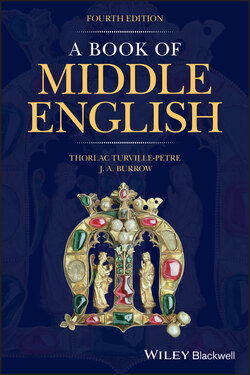Читать книгу A Book of Middle English - J. A. Burrow - Страница 49
4.5.4 Past of Weak Verbs
ОглавлениеWeak verbs form their past tense by adding ‐ed(e), ‐d(e) or ‐t(e), and their past participle by adding ed, ‐d or ‐t; thus heren, ‘to hear’, past tense herde, past participle iherd; luvien, ‘to love’, past tense luvede, past participle iluvet; slepen, ‘to sleep’, past tense slepte.
The past tense of heren, ‘to hear’, in the language of the Ancrene Wisse:
| indicative | |||
| sg. | 1 | ich | herde |
| 2 | þu | herdest | |
| 3 | he | herde | |
| pl. | we, ʒe, ha | herden | |
| subjunctive | |||
| sg. | ich, þu, he | herde | |
| pl. | we, ʒe, ha | herden | |
| past participle | iherd |
With the loss of ‐en and then of ‐e, the past tense is often unchanged throughout except for the ‐est of the second person singular of the indicative. In the North and the North Midlands the second person singular ends ‐es/‐ez, as in sendez, 8/415, or has ‐e or no ending so that there is one form throughout the past; e.g. second person singular þou me herde, 8/306, past participle (with ‘unhistorical’ ‐e) I haf herde, 9/26.
A few common verbs historically classed as weak not only add ‐t(e) in the past tense but also modify the stem itself. Most have survived into Modern English. Examples taken from the Gawain poems are:
| infinitive | pa. and pp. |
| bryng, ‘bring’ | broʒt |
| seche, ‘seek’ | soʒt |
| þenk, ‘think’ | þoʒt |
| þynk, ‘seem’ | þuʒt |
| worch, ‘work’ | wroʒt |
